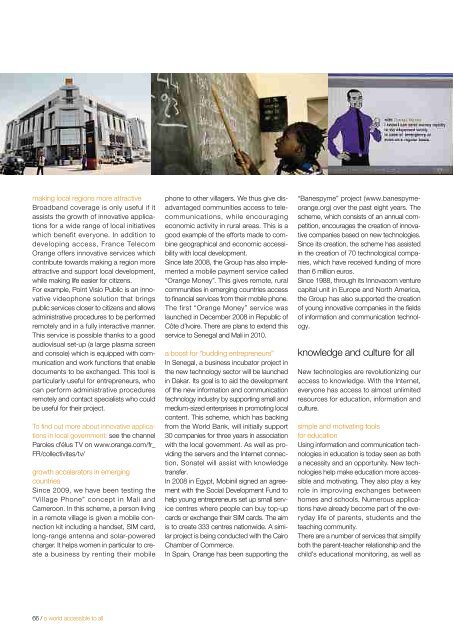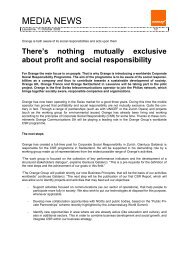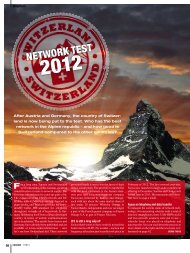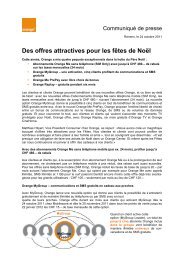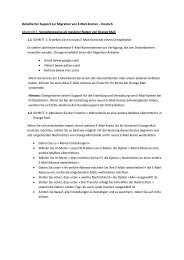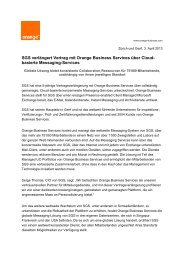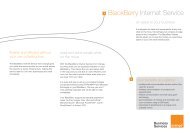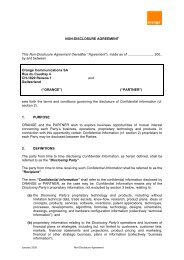corporate social responsibility complete report France ... - Orange
corporate social responsibility complete report France ... - Orange
corporate social responsibility complete report France ... - Orange
Create successful ePaper yourself
Turn your PDF publications into a flip-book with our unique Google optimized e-Paper software.
making local regions more attractive<br />
Broadband coverage is only useful if it<br />
assists the growth of innovative applications<br />
for a wide range of local initiatives<br />
which benefit everyone. In addition to<br />
developing access, <strong>France</strong> Telecom<br />
<strong>Orange</strong> offers innovative services which<br />
contribute towards making a region more<br />
attractive and support local development,<br />
while making life easier for citizens.<br />
For example, Point Visio Public is an innovative<br />
videophone solution that brings<br />
public services closer to citizens and allows<br />
administrative procedures to be performed<br />
remotely and in a fully interactive manner.<br />
This service is possible thanks to a good<br />
audiovisual set-up (a large plasma screen<br />
and console) which is equipped with communication<br />
and work functions that enable<br />
documents to be exchanged. This tool is<br />
particularly useful for entrepreneurs, who<br />
can perform administrative procedures<br />
remotely and contact specialists who could<br />
be useful for their project.<br />
To find out more about innovative applications<br />
in local government: see the channel<br />
Paroles d’élus TV on www.orange.com/fr_<br />
FR/collectivites/tv/<br />
growth accelerators in emerging<br />
countries<br />
Since 2009, we have been testing the<br />
“Village Phone” concept in Mali and<br />
Cameroon. In this scheme, a person living<br />
in a remote village is given a mobile connection<br />
kit including a handset, SIM card,<br />
long-range antenna and solar-powered<br />
charger. It helps women in particular to create<br />
a business by renting their mobile<br />
phone to other villagers. We thus give disadvantaged<br />
communities access to telecommunications,<br />
while encouraging<br />
economic activity in rural areas. This is a<br />
good example of the efforts made to combine<br />
geographical and economic accessibility<br />
with local development.<br />
Since late 2008, the Group has also implemented<br />
a mobile payment service called<br />
“<strong>Orange</strong> Money”. This gives remote, rural<br />
communities in emerging countries access<br />
to financial services from their mobile phone.<br />
The first “<strong>Orange</strong> Money” service was<br />
launched in December 2008 in Republic of<br />
Côte d’Ivoire. There are plans to extend this<br />
service to Senegal and Mali in 2010.<br />
a boost for “budding entrepreneurs”<br />
In Senegal, a business incubator project in<br />
the new technology sector will be launched<br />
in Dakar. Its goal is to aid the development<br />
of the new information and communication<br />
technology industry by supporting small and<br />
medium-sized enterprises in promoting local<br />
content. This scheme, which has backing<br />
from the World Bank, will initially support<br />
30 companies for three years in association<br />
with the local government. As well as providing<br />
the servers and the Internet connection,<br />
Sonatel will assist with knowledge<br />
transfer.<br />
In 2008 in Egypt, Mobinil signed an agreement<br />
with the Social Development Fund to<br />
help young entrepreneurs set up small service<br />
centres where people can buy top-up<br />
cards or exchange their SIM cards. The aim<br />
is to create 333 centres nationwide. A similar<br />
project is being conducted with the Cairo<br />
Chamber of Commerce.<br />
In Spain, <strong>Orange</strong> has been supporting the<br />
“Banespyme” project (www.banespymeorange.org)<br />
over the past eight years. The<br />
scheme, which consists of an annual competition,<br />
encourages the creation of innovative<br />
companies based on new technologies.<br />
Since its creation, the scheme has assisted<br />
in the creation of 70 technological companies,<br />
which have received funding of more<br />
than 6 million euros.<br />
Since 1988, through its Innovacom venture<br />
capital unit in Europe and North America,<br />
the Group has also supported the creation<br />
of young innovative companies in the fields<br />
of information and communication technology.<br />
knowledge and culture for all<br />
New technologies are revolutionizing our<br />
access to knowledge. With the Internet,<br />
everyone has access to almost unlimited<br />
resources for education, information and<br />
culture.<br />
simple and motivating tools<br />
for education<br />
Using information and communication technologies<br />
in education is today seen as both<br />
a necessity and an opportunity. New technologies<br />
help make education more accessible<br />
and motivating. They also play a key<br />
role in improving exchanges between<br />
homes and schools. Numerous applications<br />
have already become part of the everyday<br />
life of parents, students and the<br />
teaching community.<br />
There are a number of services that simplify<br />
both the parent-teacher relationship and the<br />
child’s educational monitoring, as well as<br />
66 / a world accessible to all


